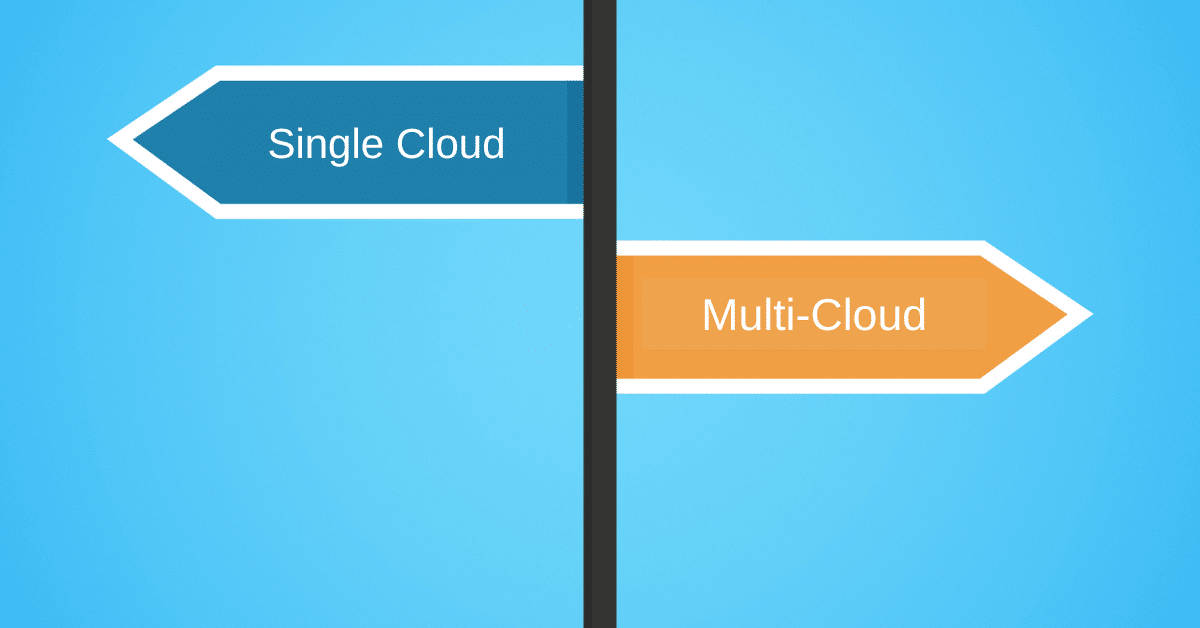I. Introduction

In today’s digital era, businesses are increasingly relying on cloud platforms to store and manage their data. However, as businesses adopt multiple cloud services, managing and integrating them can become a challenge. This is where a B2B multicloud platform can be a game-changer.
A B2B multicloud platform is a cloud computing solution that enables businesses to manage multiple cloud services from a single unified platform. It allows businesses to integrate, manage, and optimize cloud services from multiple providers. In simple terms, a B2B multicloud platform provides a centralized solution to manage different cloud services that a business might be using.
Managing multiple cloud services can be a daunting task for businesses. With different cloud services from multiple providers, businesses can face challenges in terms of interoperability, security, and cost optimization. This is where a B2B multicloud platform comes in handy. A multicloud platform can help businesses to integrate different cloud services, manage them efficiently, and optimize their costs.
One of the primary benefits of a B2B multicloud platform is centralized management. With a B2B multicloud platform, businesses can manage their cloud services from a single platform, providing a unified view of their cloud operations. This enables businesses to manage and monitor their cloud services more efficiently and effectively, reducing the need for multiple tools and interfaces.
Cost optimization is another significant benefit of a B2B multicloud platform. With a multicloud platform, businesses can choose the right cloud services and providers, helping them to optimize their cloud costs. A multicloud platform can provide businesses with cost monitoring and analysis tools, enabling them to identify opportunities for cost optimization and savings.
Interoperability is another significant benefit of a B2B multicloud platform. With a multicloud platform, businesses can integrate different cloud services from different providers, making them interoperable. This can help businesses to improve the overall efficiency and effectiveness of their cloud operations, enabling them to leverage the benefits of different cloud services without facing interoperability challenges.
Security is another key benefit of a B2B multicloud platform. With a multicloud platform, businesses can improve their cloud security by managing and monitoring their cloud services from a single platform. A multicloud platform can provide businesses with security features such as data encryption, access control, and compliance certifications, ensuring that their cloud operations are secure and well-managed.
In summary, a B2B multicloud platform provides businesses with a centralized solution to manage and optimize their cloud services. By providing centralized management, cost optimization, interoperability, and security, a multicloud platform can help businesses to manage their cloud services more efficiently and effectively.
II. Understanding The Multicloud Platform
A multicloud platform is a cloud computing solution that enables businesses to manage multiple cloud services from different providers. It provides a centralized solution for businesses to integrate and manage different cloud services from different providers.
In a multicloud platform, businesses can choose to use different cloud services from multiple providers, such as Amazon Web Services, Microsoft Azure, and Google Cloud Platform. A multicloud platform enables businesses to leverage the strengths of different cloud providers and optimize their cloud costs.
Difference between single cloud and multicloud platform

A single cloud platform is a cloud computing solution where a business uses a single cloud service from a single provider. For example, if a business is using Amazon Web Services, they are using a single cloud platform from a single provider. Single cloud platforms are often chosen for their simplicity, ease of use, and cost-effectiveness.
Single cloud platforms are suitable for businesses that have simple cloud requirements and do not need to use multiple cloud services from different providers. For example, a small business that only needs to store and manage its data in the cloud might choose a single cloud platform.
However, as businesses grow and their cloud requirements become more complex, a single cloud platform may no longer be sufficient. This is where a multicloud platform comes in.
In a multicloud platform, businesses use multiple cloud services from multiple providers. A multicloud platform enables businesses to choose the right cloud services from different providers and integrate them into a single unified platform. Multicloud platforms are often chosen for their flexibility, scalability, and interoperability.
Multicloud platforms allow businesses to use the best cloud services and providers for their specific needs. For example, a business might use Amazon Web Services for its storage needs, Microsoft Azure for their data analytics, and Google Cloud for its machine learning requirements. By using multiple cloud services from different providers, businesses can optimize their cloud operations and achieve better performance and functionality.
Another benefit of a multicloud platform is interoperability. Multicloud platforms enable businesses to integrate different cloud services from different providers, making them interoperable. This ensures that different cloud services can work together seamlessly, improving the overall efficiency and effectiveness of cloud operations.
Advantages of using a multicloud platform
There are several advantages of using a multicloud platform:
Flexibility: A multicloud platform enables businesses to choose the right cloud services from different providers based on their needs and requirements.
Scalability: A multicloud platform enables businesses to scale their cloud services based on their needs, without having to worry about vendor lock-in.
Cost optimization: A multicloud platform enables businesses to optimize their cloud costs by choosing the right cloud services and providers.
Interoperability: A multicloud platform enables businesses to integrate different cloud services from different providers, making them interoperable.
In the next section, we will explore the need for a B2B multicloud platform, and how it can help businesses in a B2B context.
III. The Need for B2B Multicloud Platform
Businesses that use multiple cloud platforms face several challenges, such as interoperability, security, and cost optimization. Managing different cloud platforms from different providers can be a daunting task, and can result in increased complexity and costs for businesses.
A B2B multicloud platform can help businesses in a B2B context in several ways. It can help businesses to manage different cloud services and providers from a single platform, enable interoperability between different cloud services and optimize their cloud costs.
IV. How B2B Multicloud Platform Works
A B2B multicloud platform operates by integrating different cloud services and providers into a single unified platform. This platform provides businesses with a centralized solution for managing and optimizing different cloud services while ensuring interoperability between different cloud services. The platform provides a range of features and benefits, including centralized management, interoperability, cost optimization, scalability, and security.
Centralized management: A B2B multicloud platform provides businesses with centralized management of different cloud services from different providers. This enables businesses to manage their cloud services from a single platform, reducing the need for multiple tools and interfaces.
Interoperability: A B2B multicloud platform enables interoperability between different cloud services, allowing businesses to integrate different cloud services and providers into a unified platform. This ensures that different cloud services can work together seamlessly, improving the overall efficiency and effectiveness of cloud operations.
Cost optimization: A B2B multicloud platform provides businesses with tools and features for optimizing their cloud costs. This includes features such as cost monitoring, cost analysis, and cost optimization tools, enabling businesses to reduce their cloud costs while maintaining performance and functionality.
Scalability: A B2B multicloud platform provides businesses with scalability, enabling them to easily scale their cloud operations up or down depending on their needs. This ensures that businesses can maintain performance and functionality even as their cloud needs change over time.
Security: A B2B multicloud platform provides businesses with security features and tools for protecting their cloud services and data. This includes features such as data encryption, access control, and compliance certifications, ensuring that businesses can maintain the security and integrity of their cloud operations.
V. Choosing the Right B2B Multicloud Platform
Factors to consider when choosing a B2B multicloud platform
- Cloud requirements: Businesses should consider their cloud requirements when choosing a B2B multicloud platform. This includes evaluating their existing cloud infrastructure, the types of cloud services they use, and the specific needs of their business.
- Features of the platform: Businesses should evaluate the features and capabilities of different B2B multicloud platforms before choosing one. This includes evaluating the platform’s scalability, interoperability, ease of use, and integrations with other tools and services.
- Cost of the platform: Cost is an important factor to consider when choosing a B2B multicloud platform. Businesses should evaluate the pricing model of different platforms and consider the total cost of ownership, including any additional costs such as training, support, and maintenance.
- Security of the platform: Security is a critical factor to consider when choosing a B2B multicloud platform. Businesses should evaluate the security features of different platforms, such as data encryption, access control, and compliance certifications. They should also consider the reputation and track record of the platform provider in terms of security and data protection.
- Support and maintenance: Businesses should evaluate the level of support and maintenance provided by different B2B multicloud platforms. This includes evaluating the platform provider’s support team, documentation, and training resources, as well as the availability of updates and upgrades.
By considering these factors, businesses can choose a B2B multicloud platform that best suits their needs and requirements, and ensures optimal performance, security, and cost-effectiveness.
Comparison of popular B2B multicloud platforms
- IBM Cloud Pak: IBM Cloud Pak for Multicloud Management is a multicloud management solution that provides businesses with a unified platform for managing multiple cloud services from different providers. The platform offers features such as automated governance, risk and compliance management, and cost optimization. IBM Cloud Pak for Multicloud Management also supports a wide range of cloud services, including Amazon Web Services, Microsoft Azure, and Google Cloud Platform.
- VMware Suite: VMware vRealize Suite is a cloud management platform that enables businesses to manage their cloud infrastructure across multiple clouds, including private, public, and hybrid clouds. The platform offers features such as automation, orchestration, and analytics, as well as support for a wide range of cloud services, including Amazon Web Services, Microsoft Azure, and Google Cloud Platform.
- Red Hat OpenShift: Red Hat OpenShift is a container application platform that provides businesses with a consistent platform for developing, deploying, and managing containerized applications across multiple clouds. The platform offers features such as automated operations, security, and scalability, as well as support for a wide range of cloud services, including Amazon Web Services, Microsoft Azure, and Google Cloud Platform.
Each of these B2B multicloud platforms provides businesses with different features and benefits, and businesses should choose a platform that best suits their needs. For example, businesses that require advanced governance and compliance features may choose IBM Cloud Pak for Multicloud Management, while businesses that require containerization capabilities may choose Red Hat OpenShift. It is important for businesses to evaluate the features and benefits of each platform and choose one that meets their specific requirements.
Tips for selecting the right B2B multicloud platform for your business needs
- Evaluate your cloud requirements: Before selecting a B2B multicloud platform, it is important to evaluate your cloud requirements. This includes identifying the types of cloud services you use, the amount of data you store, and the specific needs of your business. By understanding your cloud requirements, you can choose a platform that best meets your needs.
- Consider the features and benefits of different platforms: It is important to evaluate the features and benefits of different B2B multicloud platforms before choosing one. This includes considering factors such as scalability, interoperability, ease of use, and security. By evaluating the features and benefits of different platforms, you can choose one that best meets your specific requirements.
- Choose a platform that is easy to use and manage: When selecting a B2B multicloud platform, it is important to choose one that is easy to use and manage. This includes evaluating the platform’s user interface, documentation, and training resources. By choosing a platform that is easy to use and manage, you can minimize the amount of time and resources required to manage your cloud services.
- Consider the reputation and track record of the platform provider: It is important to consider the reputation and track record of the platform provider in terms of security, data protection, and customer support. By choosing a platform provider with a strong reputation and track record, you can ensure that your cloud services are secure and well-managed.
- Evaluate the total cost of ownership: When selecting a B2B multicloud platform, it is important to evaluate the total cost of ownership. This includes considering the platform’s pricing model, as well as any additional costs such as training, support, and maintenance. By evaluating the total cost of ownership, you can choose a platform that provides the best value for your business.
By following these tips, businesses can select a B2B multicloud platform that meets their specific requirements and provides the best value. It is important to carefully evaluate different platforms and choose one that provides the right features, benefits, and ease of use for your business.
VI. Conclusion
For businesses looking to adopt a B2B multicloud platform, it is important to evaluate their cloud requirements and choose a platform that best suits their needs. Businesses should consider the features and benefits of different platforms, and choose a platform that is easy to use and manage. It is also important to ensure that the platform is secure and provides interoperability between different cloud services.
In conclusion, a B2B multicloud platform is a powerful solution for businesses that use multiple cloud services from different providers. It provides businesses with centralized management, interoperability, cost optimization, scalability, and security. As more businesses adopt multicloud strategies, B2B multicloud platforms are expected to become more sophisticated and advanced. By choosing the right B2B multicloud platform, businesses can streamline their cloud operations and improve their overall performance.
FAQ
Q: What is a B2B multicloud platform?
A: A B2B multicloud platform is a cloud computing solution that enables businesses to manage multiple cloud services from different providers from a single unified platform.
Q: Why do businesses need a B2B multicloud platform?
A: Businesses need a B2B multicloud platform to manage multiple cloud services efficiently, improve interoperability between different cloud services, and optimize their cloud costs.
Q: What are the benefits of using a B2B multicloud platform?
A: The benefits of using a B2B multicloud platform include centralized management, interoperability, cost optimization, scalability, and security.
Q: How does a B2B multicloud platform work?
A: A B2B multicloud platform works by integrating different cloud services and providers into a single unified platform. It provides businesses with a centralized solution for managing and optimizing different cloud services.
Q: What are the key features of a B2B multicloud platform?
A: The key features of a B2B multicloud platform include centralized management, interoperability, cost optimization, scalability, and security.
Q: What factors should businesses consider when choosing a B2B multicloud platform?
A: Businesses should consider their cloud requirements, the features and benefits of different platforms, the cost of the platform, and the security of the platform.
Q: What are some popular B2B multicloud platforms?
A: Popular B2B multicloud platforms include IBM Cloud Pak for Multicloud Management, VMware vRealize Suite, and Red Hat OpenShift.
Q: How can businesses benefit from using a B2B multicloud platform in a B2B context?
A: Businesses can benefit from using a B2B multicloud platform in a B2B context by improving their cloud operations, optimizing their cloud costs, and improving their overall performance.
A quick overview of the topics covered in this article.
Latest Posts
April 4, 2025
April 4, 2025
Subscribe to our newsletter
Get valuable insights and business guidance sent to your email.













